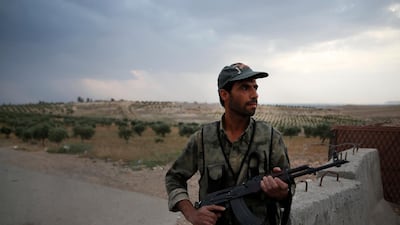In some Syrian towns north of Aleppo, there is a surprising amount of Turkish written on the buildings and spoken in the streets. The area, a few dozen kilometres from the border, has always had trade links with its northern neighbour. But now there are also Turkish troops patrolling the streets.
This is Turkey's "borderlands" strategy in action. Since getting involved in the Syrian conflict, Turkey has carved out a significant patch of territory across the north of Syria, from its borders to the Euphrates.
In towns such as Jarablus, Azaz and Al Bab – the last of these right on the outskirts of Aleppo – Turkey has poured in investment and expertise, connecting electricity and building roads. Schools, hospitals and apartment complexes have been built, essentially paid for or subsidised by the Turkish state. Turkish water suppliers and mobile phone companies have moved in. New economic zones are planned.
All of that, however, is now at risk from the Russian and Syrian regime attack on Idlib province.
Having failed to get Damascus, Tehran and Moscow to agree a ceasefire, Ankara is now scrambling to salvage what it can from its previous strategy of supporting Syrian rebels in Idlib. But as regime control moves north, there is a serious risk that all the blood and treasure Turkey has spent on these border towns might be wasted. If Turkey loses all its influence in Idlib, that would put its whole strategy in doubt.
Turkey’s borderlands strategy has been in the making for years, but it really began to take shape once the areas in question were cleared of ISIS fighters.
Over the years, the details have changed slightly, but in broad strokes the idea has remained constant: Turkey would carve out areas of northern Syria along its border, where it would remain in de facto control.
These regions would be protected by the Free Syrian Army – now the preferred name appears to be “National Army”, but it would be composed primarily of rebels who were regime opponents – who would answer to some form of Syrian interim government, separate from Damascus.
In an earlier incarnation, Ankara appears to have wanted a rival government to Damascus, but these days the towns are mostly run by Syrians forming local councils, with Turkish “advisers”.
The political logic behind this plan neatly solved two of Turkey's problems at once. Creating this buffer zone pushed Kurdish militants away from Turkey's border. The buffer zone also allowed Syrian refugees inside Turkey to be resettled on Syrian territory without being subject to the dangers of the regime.
Tens of thousands have so far been resettled. President Recep Tayyip Erdogan, well aware of the strain that three million refugees are having on the Turkish economy – and on Turks with blue collar jobs, in particular – never misses an opportunity to remind the electorate how many have been resettled. Last month he claimed a quarter of a million Syrians had left Turkey for these borderlands.
Now, all of this hangs in the balance. Last week, at a major summit in Tehran, Moscow brushed aside Turkish calls for a ceasefire on Idlib province, and air strikes and attacks are ongoing.
Turkey has supported Syrian rebels inside the province and had hoped to maintain control over it using an umbrella group of various militant factions. But the largest militant group inside Idlib, Hayat Tahrir Al Sham (HTS), refused to lay down its weapons and collaborate.
Just before last week’s critical summit between the presidents of Russia, Iran and Turkey, Erdogan abruptly added the organisation to Turkey’s list of proscribed terrorist groups, essentially accepting regime and Russian attacks on it. Without fighter jets or anti-aircraft guns, it is unlikely HTS can long survive the regime assault.
That poses a difficult problem for Turkey. If – or when – the regime retakes Idlib province, the borders of regime-controlled territory will come right up to the buffer zone that Turkey has created. That will be a combustible combination. Syrian regime troops will be facing Turkish soldiers and a region full of Syrian rebels, all of whom are arch enemies of the regime.
Moreover, Syrian Kurds have made it clear that they are willing to help the regime retake Idlib, in return for assistance driving Turks and Syrian rebels from the border towns.
At that point, which could come as early as the next few weeks, Turkey and the regime will face a pivotal dilemma. Bashar Al Assad has repeatedly said he intends to retake all of Syrian territory; having Turkish troops and Syrian rebels just on the outskirts of the country's second city would be an immense provocation. Yet Turkey has invested so much in its borderlands strategy and considers keeping Kurdish groups from its border a matter of national security.
Much might depend on how forceful the Turkish army decides to be in defence of rebel groups inside Idlib, insofar as this could set a precedent for its defence of the borderlands. But Russia has backed the regime every time it has sought to retake territory – and, given Vladimir Putin's willingness to take territory he considers to be Russian by force, it seems overwhelmingly likely that the regime will keep pushing north, all the way to the border.
Ankara is about to face a crucial test. If Turkey wants to keep its borderlands, it will have two unpalatable choices: negotiate with the Syrian regime, which it has so far refused to speak to, or dogfight Russian jets over the skies of Syria. Turkey's president would prefer to avoid both.


